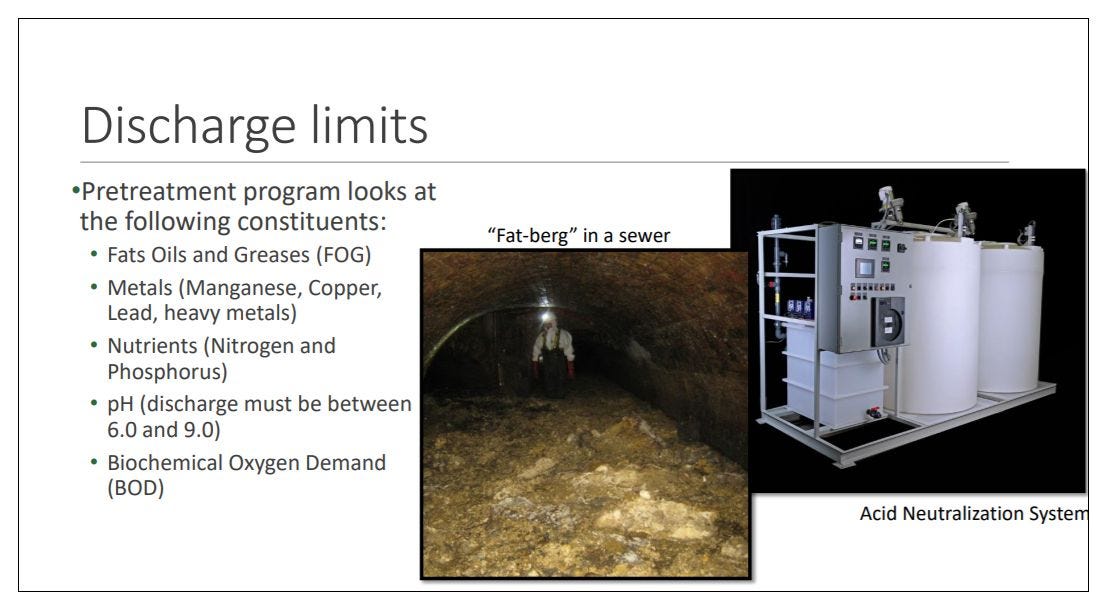In today’s first subscriber supported public service announcement, one person wants you to know about another community litter cleanup event in Albemarle, this time on October 30 in the southern part of the county.
The latest Love Albemarle event will take place between 8:30 a.m. and 11:30 a.m. at sites in Esmont, Keene, Scottsville, and North Garden. Around fifty people showed up for a similar event in Esmont this past spring, and organizers want to double that amount. Organizer Ed Brooks is seeking to get children involved, so if you’re a parent or guardian and want to spend the morning cleaning up road-side litter, register now!
On this installment of the program:
More campaign finance numbers in advance of Election Day
A preview of a film on Stan Brock, the founder of the Remote Access Medical Corps
The Chickahominy River has elevated levels of forever chemicals known as PFAS
And a quick look at the wonderful world of wastewater can help track the scope of the PFAS problem
Virginia flags will be at half-mast for the next 30 days to mourn the passing of former Governor Linwood Holton. Holton was elected in 1969 as the first Republican governor of the 20th Century, though he would later endorse Democratic candidates for statewide office. Holton was born in Big Stone Gap in 1923 and died at his home in Kilmarnock yesterday. (Wikipedia)
While in office, Holton and his wife sent their children to public schools. Governor Ralph Northam noted that in a statement yesterday.
“If you want to know what American strength looks like, look at the famous photographs of Governor Holton—smiling, as he walked his children to Richmond’s public schools during the tensest moments of desegregation,” Northam said. “He faced down Virginia’s demons and enabled this Commonwealth to look ahead.”

In the most recent letter, we took a look at campaign finance for local candidates in Albemarle County, Charlottesville, and Nelson County. Election day is just a few days away. Today let’s look at House of Delegates races. Albemarle County currently has four different districts within it boundaries.
Let’s start with the 25th House District, which stretches from Albemarle into Augusta and Rockingham Counties. Democrat Jennifer Kitchen is challenging incumbent Republican Chris Runion. Kitchen began the October reporting period with $108,930 on hand, raised an additional $29,673, and spent $37,189.
Runion began October with $77,655, raised an additional $37,837, spent $39,320 in cash, and recorded $16,314 in in-kind donated expenses.
The 57th District includes all of Charlottesville and some of Albemarle. Incumbent Democrat Sally Hudson began October with $29,158 on hand, raised $24,469, spent $7,482 in cash, and recorded $2,499 in in-kind expenses. Hudson’s Republican challenger, Philip Hamilton, began the month with $2,917 in the bank. He raised $495 and spend $1,468.
The 58th District consists of eastern Albemarle, all of Greene County, and parts of Fluvanna and Rockingham counties. Incumbent Republican Rob Bell began October with $354,466 in the bank and raised $89,293 in the first three weeks of the month. Bell’s campaign spent $164,137 during the period and recorded $21,435 in expenses.
Bell’s challenger is Democrat Sara Ratcliffe. Ratcliffe began October with $14,035 in the bank and raised $48,668 in the period. She spent $28,618 in cash and marked $24,928 in in-kind expenses.
Southern Albemarle is within the 59th District, which also includes portions of Appomattox, Buckingham, Nelson, and Campbell counties.
Republican Matt Fariss is the incumbent and he began the month with $29,671 in the bank. His campaign raised $18,285 in the period and spent $38,201 in the first three weeks. Farris had $9,755 in the bank on October 21.
His Democratic challenger Ben Moses began the month with $84,215 and raised an additional $102,505. Moses spent $76,789 in cash and recorded $61,231 in in-kind expenses. Moses has raised $603,138.01 during the campaign. (report)
Independent Louis Scicli began October with $207, raised no money, and spent no money.
Special thanks to the Virginia Public Access Project for their work in making this information accessible.
Before the passage of the Clean Water Act in 1972, it would be commonplace for factories to discharge pollutants into rivers and streams without any consideration of the effect of the natural world.
Nearly fifty years later, there is a system of permits and regulations in place to improve water quality. The Rivanna Water and Sewer Authority is working with certain industries in the community to pre-treat industrial waste before effluent is released into the ecosystem.
Patricia Defibaugh is the laboratory manager for the RWSA.
“The purpose of this program is to protect the sewer system and wastewater treatment plants through limits on industrial waste discharges,” Defibaugh said. “This is a requirement of the [U.S. Environmental Protection Agency] and the Virginia Department of Environmental Quality.”
This is part of the Virginia Pollutant Discharge Elimination System and an annual report is due to the DEQ by the end of every January. The goal is to remove as many fats, oils, greases as well as metals, nutrients, and acidity as possible by working with industries who create those waste products.
“The ones we’re concerned with are the significant industrial user, and that’s either a categorial user which is metal finishing, or semiconductor manufacturers,” Defibaugh said. “Or non-categorical which discharge more than 25,000 gallons per day or had a potential to adversely affect our treatment processes.”
The types of businesses of concern include restaurants, breweries, wineries, dentists, and dry cleaners. None of the breweries connected to urban water exceed the 25,000 gallon threshold. Gary O’Connell, executive director of the Albemarle County Service Authority, said there is a program that seeks to remove cooking oil from the wastewater process.
“There’s an active [fats, oil, and grease] program that goes on,” O’Connell said. “I know in our case it’s about 260 grease traps that we inspect.
On the more industrial level, the RWSA has three companies that are in the pretreatment program. These are Virginia Diodes, Mikro, and Northrup Grumman.
For more information on this topic, visit Henrico County’s Industrial Pretreatment Program.
PFAS concerns
Fifty years after the Clean Water Act, there are concerns about other pollutants that are not easily seen.
In 2020, the Virginia General Assembly passed legislation requiring the Virginia Department of Health to study the level of polyfluorinated substances in drinking water (PFAS). These are chemical byproducts of the processes used to make non-stick cooking utensils, fire-fighting foam, food packaging, and other uses They are known as “forever chemicals” because they do not break down. The health effects are being studied. (CDC fact-sheet on PFAS).
The industrial pretreatment work will be used to help identify the scope of the problem.
“DEQ is going to be sending out a survey to Rivanna’s significant industrial users to confirm their use and manufacture of PFAS compounds,” Defibaugh said.
Yesterday, the DEQ announced that elevated levels of PFAS have been found in the Chickahominy River. They found out from a report from the Newport News Waterworks (NNWW) and now the DEQ will work with the VDH to further study the issue.
“NNWW is continuing to monitor source waters in coordination with state agencies and has assured residents that the water it provides to its customers is safe to drink and has consistently shown PFAS levels well below the lifetime health advisory from the U.S. Environmental Protection Agency (EPA),” reads the press release.
Last week, the EPA announced a national strategy will be undertaken to confront the PFAS problem.
“EPA’s Roadmap is centered on three guiding strategies: Increase investments in research, leverage authorities to take action now to restrict PFAS chemicals from being released into the environment, and accelerate the cleanup of PFAS contamination,” reads a press release from that initiative.
Next up, a quick Patreon-fueled shout-out!
Fall is here, and with it, more moderate temperatures. While your HVAC takes a break, now is the perfect time to prepare for the cooler months. Your local energy nonprofit, LEAP, wants you and yours to keep comfortable all year round! LEAP offers FREE home weatherization to income- and age-qualifying residents, so, if you’re age 60 or older, or have an annual household income of less than $74,950, you may qualify for a free energy assessment and home energy improvements such as insulation and air sealing. Sign up today to lower your energy bills, increase comfort, and reduce energy waste at home!
The 34th Annual Virginia Film Festival is underway today and runs through Sunday, Halloween. In all there are dozens of films being screened in Downtown Charlottesville and at other various locations. Some of the films provide glimpses into topics of things that may not be working.
One of those is Medicine Man: The Stan Brock Story, a documentary about one person's attempt to bring healthcare to various places across the United States of America where regular care is hard to come by.
Brock is a British-born adventurer who founded Remote Area Medical, a nonprofit that holds pop-up free clinics in remote places across the world. Earlier this week I spoke with Paul Michael Angell, the director of the documentary which screens this Sunday at 1:30 p.m. at the Violet Crown. Take a listen to the podcast version to hear the interview. Or, take a look at the video interview on YouTube.
Do sign up for the podcast on Spotify, Apple Music, Audible, Amazon, or however you get your podcasts!
















Share this post